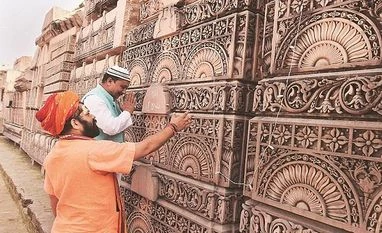By ordering the Centre to set up a trust for the construction of a temple at the Ram Janmabhoomi in Ayodhya, the Supreme Court has limited the role the Sangh Parivar, especially the Vishva Hindu Parishad (VHP), had hoped to play in that process.
While the apex court rejected the claim of Nirmohi Akhara, it asked the Centre to accommodate it in the soon-to-be set up trust. This has enthused saints to put forth their demand that the proposed trust should primarily comprise the 13 akharas of Hanumangarhi temple and other temples of Ayodhya.
The Centre would need to accomplish a balancing act in accommodating the interests of the akharas, as well as that of the VHP. The precedents of temple trusts available with the Centre are the Shri Mata Vaishno Devi Shrine Board and the Shri Somnath Trust.
The sadhu samaj has reminded the government of the decision taken in its all India conference on December 29, 2017, when it said the descendants of the late Baba Abhiram Das should be the priests of the new temple. They said Das had placed the idols in 1949, and “external parties” not part of the sadhu samaj of Ayodhya should have little role and be denied the responsibilities of a pujari in the soon to be constructed temple.
The Supreme Court has asked the Centre to set up a trust within three months. According to sources, the Union culture and law ministries will have consultations over the next week, in the run-up to the winter session of Parliament that begins on November 18, to draft a Bill for setting up the trust.
The Somnath temple trust is a religious charitable trust registered under the Gujarat Public Trust Act, 1950. The Vaishno Devi Shrine Board runs the temple in Jammu. It was set up in 1988 through an Act of the now erstwhile Jammu and Kashmir Assembly. The Shri Amarnathji Shrine Board is also based on the Vaishno Devi Shrine Act.
The governor of Jammu and Kashmir is the ex-officio chairman of the Vaishno Devi shrine board and nominates nine members to the board. According to the Act, these are two persons who have distinguished themselves in the service of the Hindu religion, two women who have worked in the service of Hindu religion, or done social work, three persons with experience in administration, legal affairs and financial matters, and two eminent Hindus of J&K. The members have a term of three years. The current members of the board include Sri Sri Ravi Shankar, a former judge, retired bureaucrats, etc.
The board discharges its duty through a chief executive officer, currently an officer of the Indian Administrative Service, and other functional heads. Its income comes from donations by devotees and interest accrued from deposits and dividends, and it carries out the development and maintenance work of the temple.
The Somnath trust, however, is entirely dominated by politicians. Currently, Prime Minister Narendra Modi, Home Minister Amit Shah, senior BJP leader L K Advani and former Gujarat Chief Minister Keshubhai Patel are part of the eight-member board of trustees, which also includes a chairman and a secretary. Board of trustees are elected for life but can be removed.
The Somnath trust manages the Somnath temple, 64 other temples in Prabhas Patan, its guesthouses, and the 2,000 acres it owns. The trust does not give any share of its temple revenue to the government and has in the recent past issued public notices asking non-Hindus to seek permission from the general manager of the temple before entering the main structure.
The first Home Minister of India Sardar Vallabhbhai Patel was the moving force behind the reconstruction of the temple. While then Prime Minister Jawaharlal Nehru was not keen that public money be spent on constructing the temple, Patel and educationist K M Munish raised the money from through public subscriptions, including from industrialists like G D Birla, who was a member of the first board of trustees. Advani had started his Rath Yatra in 1990 from the Somnath temple.
Unlock 30+ premium stories daily hand-picked by our editors, across devices on browser and app.
Pick your 5 favourite companies, get a daily email with all news updates on them.
Full access to our intuitive epaper - clip, save, share articles from any device; newspaper archives from 2006.
Preferential invites to Business Standard events.
Curated newsletters on markets, personal finance, policy & politics, start-ups, technology, and more.
)